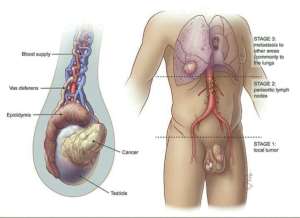
Testicular cancer occurs in the testicles (testes), which are located inside the scrotum (a loose bag of skin underneath the penis). The testicles produce male sex hormones and sperm for reproduction.
Testosterone is the hormone responsible for the development of the reproductive organs and other male physical characteristics.
Testicular cancer is rare compared with other cancers (0.7 percent of all cancers), yet it is the most common cancer in males aged between 15 and 35 years. And even though is highly treatable (when cancer has even spread beyond the testicle), 390 men out of 8,000 males in the United States are diagnosed with testicular cancer each year.
Symptoms
In most cases, the individual finds the cancer himself. Other times, it is discovered by doctors during a routine physical examination.
The signs and symptoms of testicular cancer include:
- A lump or enlargement in either testicle
- A feeling of heaviness in the scrotum
- A dull ache in the abdomen or groin
- A sudden accumulation of fluid in the scrotum
- Pain or discomfort in a testicle or the scrotum
- Enlargement or tenderness of the breasts
- Back pain
NB: These symptoms may not necessarily be caused by cancer. Better still, individuals should not ignore a lump or swelling in the testicle but should rather see a doctor immediately to determine the cause.
Also, testicular cancer has the ability to invade and sometimes metastasize other organs.
Causes
It is not clear what causes testicular cancer in most cases.
Testicular cancer occurs when healthy cells in a testicle become altered. Healthy cells grow and divide in an orderly way to keep one’s body functioning normally. But sometimes some cells develop abnormally, causing this growth to get out of control — these cancer cells continue dividing even when new cells aren't needed. The accumulating cells form a mass in the testicle.
Risk Factors
Although the specific causes of testicular cancer are unknown, there are some factors which may increase a man's risk of developing the disease.These factors include:
- An undescended testicle (cryptorchidism) : Men who have a testicle that never descended are at greater risk of testicular cancer in either testicle than men whose testicles descended normally.
- Klinefelter's syndrome (causes abnormal development of testicle)
- Family history.
- Age. Mostly affects men between ages 15 and 35, however, it can occur at any age.
- Race. Testicular cancer is more common in white men than in black men.
Treatment
Treatment of testicular cancer depend on several factors, including the type and stage of cancer, your overall health, and your own preferences.
Surgery
- Radical Inguinal Orchiectomy : A surgery to remove the testicle.
- Lymph node surgery : Surgical removal of affected lymph nodes.
Radiation Therapy
- Uses high-powered energy beams, such as X-rays, to kill cancer cells.
Chemotherapy
- Uses drugs to kill cancer cells.
Preventive Measures
There is no way to prevent testicular cancer.
However, most doctors recommend regular testicle self-examinations to identify testicular cancer at its earliest stage.
Testicle Self-examination
- Stand in front of a mirror. Look for any swelling on the skin of the scrotum.
- Examine each testicle with both hands. Place the index and middle fingers under the testicle while placing your thumbs on the top.
- Gently roll the testicle between the thumbs and the fingers. Remember that the testicles are usually smooth, oval shaped and somewhat firm. It's normal for one testicle to be slightly larger than the other. Also, the cord leading upward from the top of the testicle (epididymis) is a normal part of the scrotum. By regularly performing this exam, you can become more familiar with your testicles and aware of any changes that might be of concern.
If you find a lump, make an appointment with your doctor.
ACKNOWLEDGMENT
Dr. Kingsley Preko
Mr. Benjamin K. Sammy
Mr. Emmanuel Boadi Ampomah
WRITTEN BY: Miss Hannah Sammy (A level 200 Physician Assistant Studies student in the University of Cape Coast).




 Akufo-Addo commissions Phase II of Kaleo solar power plant
Akufo-Addo commissions Phase II of Kaleo solar power plant
 NDC panics over Bawumia’s visit to Pope Francis
NDC panics over Bawumia’s visit to Pope Francis
 EC blasts Mahama over “false” claims on recruitment of Returning Officers
EC blasts Mahama over “false” claims on recruitment of Returning Officers
 Lands Minister gives ultimatum to Future Global Resources to revamp Prestea/Bogo...
Lands Minister gives ultimatum to Future Global Resources to revamp Prestea/Bogo...
 Wa Naa appeals to Akufo-Addo to audit state lands in Wa
Wa Naa appeals to Akufo-Addo to audit state lands in Wa
 Prof Opoku-Agyemang misunderstood Bawumia’s ‘driver mate’ analogy – Miracles Abo...
Prof Opoku-Agyemang misunderstood Bawumia’s ‘driver mate’ analogy – Miracles Abo...
 EU confident Ghana will not sign Anti-LGBTQI Bill
EU confident Ghana will not sign Anti-LGBTQI Bill
 Suspend implementation of Planting for Food and Jobs for 2024 - Stakeholders
Suspend implementation of Planting for Food and Jobs for 2024 - Stakeholders
 Tema West Municipal Assembly gets Ghana's First Female Aircraft Marshaller as ne...
Tema West Municipal Assembly gets Ghana's First Female Aircraft Marshaller as ne...
 Dumsor is affecting us double, release timetable – Disability Federation to ECG
Dumsor is affecting us double, release timetable – Disability Federation to ECG
